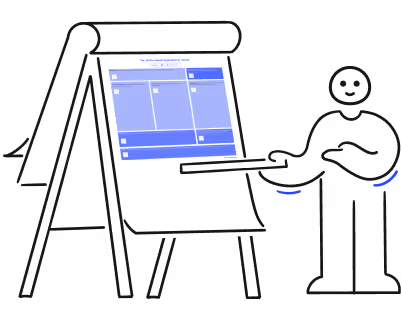Employee training vs skill development: what is the difference?

Empower your organization with the skills-based canvas.

Is there really a difference between employee training and skill development?
When we talk about corporate training, our first impulse is to associate it with a specific performance goal, related to a specific position. If we train our employees, they will be better equipped to perform the tasks entailed by their position.
But corporate training can be a lot more!
Training allows you to prepare your employees for leadership roles within your organization. It is a great way to overcome labor shortage, among others.
The biggest benefit of training for you, as a manager, is having predictability and being able to control the growth of your workforce.
It also meets one of your employees’ fundamental needs: the need for professional development. And the more you invest in their careers, the more grateful they will be and, possibly, the longer they will stay on your team.
Skill development contributes to the success of corporate training, and vice versa!
So, what is the difference between the two? And more importantly, how and when should you apply them?
Employee development and skill development
According to the Merriam-Webster dictionary, development means "elaboration, evolution, expansion, growth, progress, progression".
Like any other business manager, you want your business to grow. You probably already know that a company that evolves positively is a company that takes care of its employees.
Skill development is related to the strategic aspect of your business as well as to the human resources aspect: therefore, it is as important for you as it is for your employees that they get training.
Having an adequate professional development plan makes your teams feel more at home.
There are several types of development. This article addresses employee training and skill development.
Employee training
Employee training is the educational process aimed at meeting a specific short-term need for skills and knowledge. Most of the time, it relates to tasks the employee is already performing.
Learning procedures, as a new employee, or becoming familiar with new tools are both examples of corporate training.
By having a good professional development plan, you will be able to reach your different goals, and improve employee onboarding.
Because it is generally more structured and conducted in a controlled environment, employee training allows you to formally teach a skill.
Skill development
Skill development aims to develop employees’ general skills that will impact several aspects of their work. The new skills can apply to an employee’s current tasks or prepare them for tasks you are considering delegating to them.
For example, you may want to develop an employee’s empathy, if they are being considered for a management position. You may also want to increase the understanding of a specific topic for an employee who would like to apply for a specialist role.
Skill development makes it possible to deepen knowledge, to increase understanding and to perfect the given topic.
Skill development is the learning of a specific topic that lasts over time. Such continuous training keeps your teams motivated to do their jobs well.
Developing your employees’ skills means thinking about the future needs and challenges, and working with a prevention mindset, which saves time and money in the long run.
Skill development creates a proactive approach that allows you to think better, if a problem comes up later. To properly set your priorities, start by doing a skill gap analysis.
Offering your employees the possibility to have the time to learn helps your company grow, and it creates a sense of belonging and loyalty within your company.
The difference between employee training and skill development
The two concepts are very similar and they overlap. They are equally needed in order to have a real impact on the development of our employees.
In a way, employee training is the vehicle for skill development. And skill development is a strategy that contributes to employee training.
Here are some of the key differences between the two:
For example, employee training addresses an immediate need that will allow your employee to carry out his work and have a basic training level.
On the other hand, skill development is an investment that will allow your team not only to deepen their knowledge of a specific topic, but also to create a bond with the company, because it is investing in them, which ultimately adds value to your business.
Training can be used in many ways by offering a quality, customized, employee experience path so that your teams are satisfied with their work environment.
This is an opportunity to think outside the box and improve your employee experience.
The main difference between employee training and skill development is the type of learning to be offered, and the needs addressed, which vary from short to long term.
Deciding on what to use
Employee training or development is mainly focused on learning new information:
- when onboarding a new employee,
- when changing position with the company,
- when learning a new tool,
- etc.
Employee training provides the foundation needed for the work to be completed, while skill development is useful for fine-tuning what the employee already knows.
Offering your employees the opportunity to learn the basic skills for their work is beneficial not only for them, but also for your company, as it enables them to do their work more productively and profitably.
You can benefit from the training for both the human resources and strategic aspects, and thus bring value to your company.
A training program that is adapted to the level and progress of your employees is a good professional development plan for your teams and your business alike.
In order to have a positive impact, you must do this correctly. So consider it carefully, when it comes time to training your employees.
It could take the shape of mentoring, videos, etc. as long as it addresses both employee training and skill development.
How can an LMS help train employees and develop their skills?
Whether you use it for continuing training, onboarding a new employee or skill development, setting up a new training takes time.
The big advantage of online training is that once you have created your training, you don’t have to start again. Even better, you can enroll all your employees the training is relevant for and save big on time and money!
The important thing is being able to access the information quickly so that your employees can train by themselves, without needing help from colleagues.
Using an online learning management system makes it possible to create content catered to your needs. For example, content for employee development and skill development are two different things.
You can also create specific training content for each area of expertise:
- Sales and business development,
- Customer service,
- Support and operations,
- Leadership and sound management,
- etc.
The force of a company lies mainly in its employees and the skill pool it has and puts forward.
That is why the training and learning methods used are an essential part of the employees’ and the company’s success.
In short, employee training provides new knowledge that is directly beneficial, while skill development addresses a longer-term need.
Would you like to start using an online learning management system in your company?
%20(1).png)








.avif)


